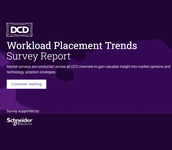Google parent company Alphabet has released its Q1 2024 financial results, with its cloud division enjoying a particularly strong quarter.
Google Cloud's revenue was up 28 percent year-on-year (YoY) to $9.6 billion. It also saw an operating income of $900 million and an operating margin of nine percent.
This strong first quarter results came as the company's CapEx expenditure for the period hit $12bn, a figure that CFO Ruth Porat expects to see repeated throughout the year.
Porat puts the Q1 performance in the cloud down to "strong demand for our GCP infrastructure and solutions as well as the contribution from our Workspace productivity tools."
She added: "The growth we are seeing across cloud is underpinned by the benefit AI provides for our customers. We continue to invest aggressively while remaining focused on profitable growth."
The vast majority of Google's CapEx went on technical infrastructure, with the largest component being servers, followed by data center investment.
Over the last few months, Google has announced several new data center projects including in Hertfordshire and Essex in the UK, South Carolina, Missouri, Virginia, and Iowa in the US. Other data center projects are also underway globally.
Porat said of Google's investment in infrastructure: "The significant YoY growth in CapEx in recent quarters reflects our confidence in the opportunities offered by AI across our business."
Google intends to continue investing in "top engineering and technical talent" particularly across the Cloud and Google DeepMind units.
Operating expenses were $21.4 billion, down 2 percent on a reported basis. This was put down to a decrease in sales, marketing, and general and administrative (G&A) expenses, offset by an increase in research and development. According to Porat, the dip in G&A expenses was primarily due to "lower charges relating to legal matters."
The first quarter saw the resolution of a $1.67bn patent infringement lawsuit regarding Google's TPUs filed by computer scientist Dr Joseph Bates in 2019. Details of the settlement were not shared.
Operating income was $25.5 billion, up 46 percent on a reported basis, and Google's operating margin was 32 percent.
CEO Sundar Pichai reflected on Google's long-term progress during the company's earnings call. "Taking a step back, it took Google more than 15 years to reach $100 billion in annual revenue. In just the last six years, we have gone from $100 billion to more than $300 billion in annual revenue," said Pichai.
Pichai added that over the past eight months the company has launched more than 1,000 new products and features, and has particularly noted its success in AI.
"Our differentiation in cloud begins with our AI hypercomputer, which provides efficient and cost-effective infrastructure to train and serve models," he said. "Today, more than 60 percent of funded gen AI start-ups and nearly 90 percent of gen AI unicorns are Google Cloud customers. And customers like PayPal and Kakao Brain are choosing our infrastructure. We offer an industry-leading portfolio of Nvidia GPUs along with our TPUs."
Earlier this month Google launched Axion, its first Arm-based CPU, and announced an updated version of its TPU AI accelerator. It claims Axion can perform up to 50 percent faster than comparable x86-based systems in benchmarking tests.




